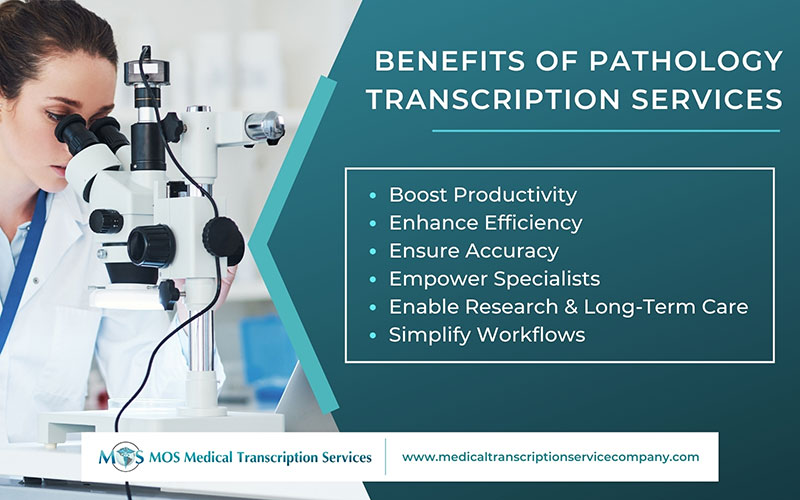Every minute matters in modern medicine. Pathologists, surgeons, and doctors are constantly under pressure to analyze, interpret, and act on diagnostic information in order to provide the best possible care to their patients. While pathology transcription forms the backbone of accurate diagnoses and treatment plans, the process of documenting these findings can be time-consuming and prone to errors if not managed effectively. This is where pathology transcription services step in as a quiet yet powerful ally for providers, transforming raw medical dictations into structured, accurate, and timely reports.
Unlike general transcription, medical transcription for pathology requires a keen understanding of medical terminology, diagnostic nuances, and the critical role pathology plays in patient care. Far from being just a clerical function, it acts as a bridge between diagnosis and treatment, ensuring that vital information is captured with precision and clarity.
How Pathology Transcription Services Helps Healthcare Providers
- Boosting Provider Productivity: For doctors and surgeons, productivity is not just about seeing more patients, it’s about making faster, better-informed decisions. Transcription of pathology reports streamlines the workflow by removing the burden of extensive manual documentation. Instead of typing lengthy notes or formatting complex pathology findings, providers can dictate their observations and move on to the next patient or case.
Professional transcriptionists trained in pathology terminology can quickly convert these dictations into well-structured reports. This allows providers to:
- Spend more time with patients rather than paperwork.
- Review and finalize reports swiftly, ensuring no bottlenecks in the diagnostic process.
- Stay organized with standardized documentation that’s easy to reference in future cases.
In essence, pathology transcription acts as a time-saver, giving providers the bandwidth to focus on their primary responsibility, delivering exceptional patient care.
- Enhancing Efficiency Across the Care Continuum: Efficiency in healthcare isn’t just about speed; it’s about ensuring every step in the process aligns smoothly. A single delay in pathology reporting can affect treatment timelines, surgical schedules, and even patient outcomes. By outsourcing transcription or using dedicated pathology transcription solutions, providers can eliminate inefficiencies such as:
- Repeated data entry
- Misinterpretation of handwritten notes
- Delays caused by fragmented communication between labs and clinics
With transcription services, pathology results can be delivered faster, clearly documented, and seamlessly integrated into Electronic Health Records (EHRs). This not only reduces turnaround times but also ensures information flows consistently across multidisciplinary teams, surgeons, oncologists, radiologists, and primary care physicians, who rely on pathology reports for decision-making.
- Accuracy That Supports Better Patient Care: Pathology findings are often the deciding factor in a patient’s diagnosis and subsequent treatment plan. A small error or ambiguity in documentation can have serious consequences. Transcription services dedicated to pathology reduce this risk by ensuring accurate pathology reports are captured with the highest level of detail.
Trained pathology transcriptionists are familiar with:
- Complex diagnostic terms and abbreviations
- The difference between benign and malignant findings
- Specific formatting requirements for pathology reports
- Critical details that must never be overlooked
By ensuring accurate documentation, transcription enhances patient safety. Providers can trust that their interpretations are reflected exactly as intended, minimizing the risk of miscommunication and showing clearly how pathology transcription improves patient care.
- Empowering Surgeons and Specialists: For surgeons, timely pathology reports are critical. Surgical decisions, such as whether to proceed with a certain procedure, alter a surgical plan, or prepare for additional interventions, often hinge on pathology results. Accurate transcription ensures these reports are available without delays and in a format that surgeons can easily interpret.
Similarly, oncologists and specialists benefit from transcription by gaining access to detailed, structured pathology reports that guide treatment regimens, such as chemotherapy cycles or targeted therapies. In this way, pathology transcription indirectly shapes the course of a patient’s medical journey, giving providers the confidence to act decisively.
- A Tool for Research and Long-Term Care: Beyond immediate patient treatment, pathology transcription also plays a role in advancing medical research and supporting long-term care. Transcribed pathology reports form part of a comprehensive data repository that can be used for:
- Tracking disease progression over time
- Contributing to clinical studies and trials
- Identifying patterns that support early detection and prevention strategies
Providers benefit by having access to organized, searchable data that enhances both their day-to-day practice and their ability to contribute to broader medical advancements.
- Making Providers’ Lives Easier: While the primary goal of pathology transcription is better patient care, its impact on provider well-being should not be underestimated. Doctors and surgeons face high levels of burnout due to administrative overload. By reducing the time spent on manual reporting, transcription services alleviate stress and allow providers to achieve a healthier balance between clinical duties and personal well-being.
The result is not only improved efficiency but also happier, more focused healthcare professionals who can dedicate their energy to the human side of medicine, listening to patients, offering reassurance, and making informed decisions.
Why Pathology Transcription Services Matter
Transcription of pathology reports is much more than a behind-the-scenes function, it is a vital enabler of productivity, efficiency, and accuracy in modern healthcare. From providing pathology documentation support to ensuring reliable reporting, these services safeguard the accuracy of diagnostic details that form the foundation of patient care.
Ultimately, by integrating pathology transcription into their workflows, providers gain the tools to work smarter, collaborate better, and focus on what truly matters: improving patient outcomes. The proof lies in how transcription services support accurate pathology reporting, a function that ensures doctors and surgeons can work at their best while patients receive the safest, most timely care possible.
In a world where time and accuracy are everything, pathology transcription services prove to be an indispensable partner for medical professionals.




